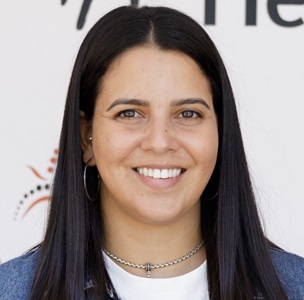
Sophie L'Estrange
Indigenous Health Scholarship
Flinders University, NT.
Doctor of Medicine
Scholarship Awarded 2025
Sponsored by:
Rotary Club of Darwin North
Student Profile
I am Sophie L’Estrange I am a Kalkadoon, Wiradjuri woman. I grew up on Wiradjuri Country in Condobolin and Forbes and completed my undergrad (B. Oral Health) in Wagga Wagga.
I come from a farming and working family. Since finishing my undergrad, I have moved throughout rural and remote NSW, QLD and NT. I have worked in the dental field in urban and remote NT Indigenous communities, fished and camped at the tip of Queensland and worked on cattle stations in the Gulf of Carpentaria and the Channel Country of SWQLD.
I am passionate about all things rural and remote health, which includes Indigenous Health. I am currently a Board Member for the Indigenous Dental Association Australia and have been actively involved with Indigenous Allied Health Australia for many years. Growing up in rural Australia, I witnessed first-hand the barriers many communities face in accessing quality healthcare. My background in oral health, combined with my personal and professional experiences in rural and remote settings, has driven me to address these health inequities.
How will I contribute to improving Indigenous health as a qualified medical practitioner or health worker?
Through my medical studies and future career, I aim to advocate for better healthcare access, reduce misinformation, and promote culturally responsive care for Indigenous populations. I am determined to play a role in bridging the health inequities gap as a medical practitioner. One of my core goals is to work in rural and
remote communities, where the need for healthcare professionals is greatest.
In addition to direct healthcare delivery, I am committed to advocating for policy change. As a doctor, I will continue to push for systemic change, particularly in policies affecting Indigenous health. I will advocate for culturally safe healthcare services, better recruitment and retention of healthcare workers in rural areas, and increased community-controlled funding for Indigenous health programs.
My experiences have taught me the importance of staying connected to community and being a voice for those who are often overlooked. As a doctor, I will continue to use my platform to advocate for the health and wellbeing of priority groups, ensuring their voices are heard and their needs are addressed..
Current Progressive Report
Semester two of second year marked a noticeable shift in my medical training, as the focus moved from intensive foundational learning toward preparation for clinical practice. While the workload remained demanding, this semester felt different in that the content increasingly asked us to think like clinicians, not just students; and to begin integrating knowledge with reasoning, communication, and professionalism.
A major focus for me in semester two was developing confidence in clinical thinking and patient interaction. Case-based learning and clinical skills sessions required me to move beyond memorisation and begin applying knowledge to patient presentations, investigations, and management plans. I found this challenging at times, but also deeply rewarding. These experiences helped me better understand what will be expected of me in the clinical environment and reinforced the importance of preparation, adaptability, and reflective practice.
Outside of university, maintaining balance remained important to me. Spending time outdoors with my horses continues to be a grounding constant in my life. It provides space to decompress, reflect, and reconnect with myself after intense study weeks. This balance has been essential in sustaining my wellbeing and allowing me to show up consistently for my studies.
As I move into semester one of third year, I choose to solidify why I chose medicine – not just as an academic pursuit, but as a deeply human profession that requires empathy, presence, and respect alongside clinical knowledge. While the transition into clinical years is undeniably daunting, it is also something I feel genuinely excited about. I am incredibly grateful to have been accepted into the Medical Education Central Australia (MECA) program with Flinders, which will see me based in Alice Springs for the duration of my third-year clinical rotations.
Looking ahead, I am grateful for the continued support that allows me to pursue this path with focus and intention. I feel increasingly aligned with the kind of doctor I hope to become, and I am committed to continuing this journey with curiosity, humility, and care.